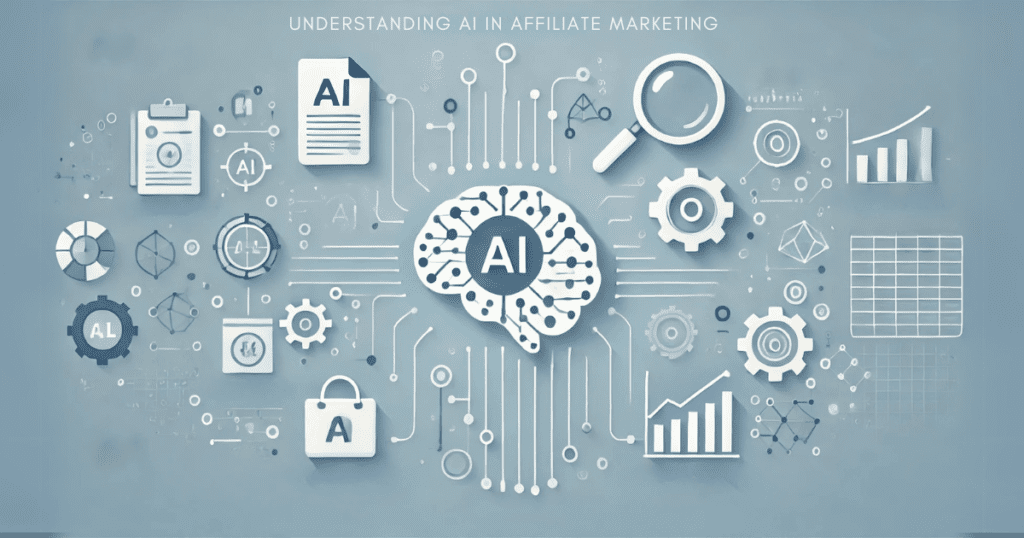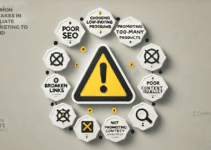
Imagine a world where your marketing efforts are guided by technology that thinks, learns, and adapts faster than you ever could. This is the reality of AI in affiliate marketing and broader marketing strategies today. In fact, AI adoption in marketing has surged by over 70% in the last five years, revolutionizing how businesses interact with their audiences. From crafting personalized experiences to automating repetitive tasks, AI in affiliate marketing is no longer a luxury—it’s a necessity.
For affiliate marketers, AI offers a game-changing opportunity to elevate their strategies. It’s not just about driving traffic anymore; it’s about driving the right traffic, predicting user behavior, and optimizing campaigns with precision. By leveraging AI, marketers can automate tedious processes, deliver tailored recommendations, and make data-driven decisions that lead to higher conversions.
In this article, we’ll explore the transformative role AI plays in affiliate marketing. You’ll discover powerful tools that can streamline your efforts, emerging trends that are shaping the industry, and practical ways to use AI to boost your affiliate marketing success. Whether you’re a beginner or a seasoned marketer, this guide will show you how AI can become your most valuable ally in the competitive world of affiliate marketing. Let’s dive in and uncover the future of marketing!
Understanding AI in Affiliate Marketing

What is AI?
Artificial Intelligence (AI) is technology that mimics human intelligence to perform tasks like learning, problem-solving, and decision-making. It uses techniques such as machine learning (teaching systems to improve over time), automation (performing repetitive tasks without human intervention), and data analysis (processing vast amounts of information to identify patterns). For affiliate marketers, AI acts as a smart assistant that analyzes data, predicts trends, and automates processes, making marketing efforts more effective and efficient.
Role of AI in Affiliate Marketing
AI has become a powerful tool in affiliate marketing, transforming how marketers reach and engage their audiences. Here’s how it plays a crucial role:
- Simplifying Repetitive Tasks: AI in affiliate marketing can handle tedious processes like tracking link performance, analyzing metrics, and reporting results. This frees up your time to focus on strategy.
- Optimizing Targeting: AI studies user behavior and demographics to ensure your campaigns reach the right audience. For example, it can predict which users are most likely to click your affiliate links or make a purchase.
- Improving Decision-Making: With AI’s predictive analytics, you can make informed decisions based on data, like which products to promote or when to run ads for maximum impact.
Key Benefits of AI in Affiliate Marketing
- Efficiency:
AI in affiliate marketing automates time-consuming tasks such as keyword research, campaign reporting, and audience segmentation. Instead of spending hours analyzing data manually, you can rely on AI in affiliate marketing to provide actionable insights in seconds. - Personalization:
AI allows you to tailor your marketing efforts to individual users. It analyzes user behavior to deliver personalized recommendations, making your content more relevant and engaging. For instance, an AI-powered platform can suggest specific products based on a user’s browsing history. - Scalability:
Whether you’re managing one campaign or twenty, AI helps you scale without sacrificing precision. It enables you to monitor and optimize multiple campaigns simultaneously, ensuring consistent results across the board.
By understanding how AI works and the benefits it offers, you can harness its power to elevate your affiliate marketing efforts, creating smarter, more impactful strategies that drive results. Next, we’ll dive into the best AI-powered tools to help you achieve your goals.
Key AI-Powered Tools for Affiliate Marketing

AI has brought an array of tools that simplify and enhance affiliate marketing efforts, making tasks like content creation, optimization, and targeting more efficient. Here are some of the most powerful AI-driven tools to help you succeed.
1. Content Creation Tools
Creating engaging and informative content is at the heart of affiliate marketing, and AI tools make this process faster and more effective:
- Jasper AI: This tool helps generate high-quality blog posts, product descriptions, and even social media captions tailored to your audience. It’s particularly useful for overcoming writer’s block and maintaining consistent content quality.
- Copy.ai: Known for its ability to craft persuasive copy, this tool is ideal for email campaigns, ad text, and headlines.
- ChatGPT: Perfect for creating conversational content, ChatGPT can draft FAQs, chat responses, or blog articles that connect with readers on a personal level.
These are just a few of the many AI tools revolutionizing affiliate marketing. For a full breakdown, explore our guide on Best AI Tools Every Affiliate Marketer Needs to Boost Success.
How It Helps:
These tools save time while ensuring your content is engaging, relevant, and optimized for conversions.
2. SEO and Analytics Tools
Driving organic traffic requires understanding search behavior and optimizing for it. AI in affiliate marketing leverages tools that make this easier:
- Surfer SEO: Helps create content that ranks well by analyzing competitors and suggesting improvements based on top-ranking pages.
- Ahrefs: A robust tool for keyword research, backlink analysis, and monitoring search engine rankings.
- Google Analytics 4: Offers AI-driven insights into user behavior, tracking metrics like bounce rates, conversions, and session durations.
How It Helps:
These tools guide your SEO strategy, ensuring your affiliate content reaches the right audience and drives meaningful traffic.
3. Ad Automation Tools
Paid advertising can be time-intensive, but AI simplifies the process:
- Scibids: Automates programmatic ad bidding, ensuring your ad budget is used efficiently by targeting high-value opportunities.
- Adzooma: Manages and optimizes ad campaigns across platforms like Google Ads, Facebook, and Microsoft Ads.
How It Helps:
These tools maximize ROI by automating ad placements, tracking performance, and identifying the best strategies to reach your audience.
4. Personalization Platforms
Tailoring your marketing efforts to individual users boosts engagement and conversions:
- Optimizely: An A/B testing platform that allows you to experiment with different headlines, CTAs, and page designs to determine what works best.
- Dynamic Yield: Offers real-time content personalization based on user preferences and behavior.
How It Helps:
Personalization platforms create experiences that feel tailored to each user, increasing the likelihood of clicks and purchases.
5. Why These Tools Matter
AI-powered tools are essential for modern affiliate marketing because they:
- Enhance Productivity: By automating repetitive tasks, they free up time for strategy and creativity.
- Improve Decision-Making: Data-driven insights guide your choices, from which products to promote to how to structure campaigns.
- Drive Results: Whether through SEO, ad automation, or personalization, these tools directly impact conversions and revenue.
Example:
Imagine using Surfer SEO to write a blog optimized for search engines, while Optimizely tests different CTAs to find the most effective one. Pair this with Scibids to automate your ad bidding, and you’ve got a streamlined, high-converting marketing strategy powered by AI.
These tools demonstrate how AI is transforming affiliate marketing, allowing you to work smarter, not harder. Next, we’ll explore the trends shaping the future of AI in this space.
Emerging AI Trends in Affiliate Marketing

AI in affiliate marketing is revolutionizing the industry by introducing innovative trends that make campaigns more effective, personalized, and secure. These trends highlight how AI in affiliate marketing continues to shape strategies, offering marketers new opportunities to connect with their audiences and maximize results.
Trend 1: Personalized Consumer Experiences
One of the most impactful trends in AI is its ability to deliver highly personalized consumer experiences. By analyzing user behavior, preferences, and purchase history, AI creates tailored recommendations that feel uniquely relevant to each individual.
- Example: E-commerce platforms like Amazon use AI to recommend products based on past purchases or browsing history. Affiliate marketers can replicate this approach by promoting products that align with their audience's interests.
- Impact: Personalization enhances user engagement and increases the likelihood of clicks and conversions, as customers are more likely to trust and act on recommendations that resonate with them.
Trend 2: Predictive Analytics
Predictive analytics leverages AI to analyze historical data and forecast future trends. This empowers marketers to make data-driven decisions about which products to promote, when to run campaigns, and how to allocate resources.
- Example: An AI tool might predict that fitness-related products will see a spike in January due to New Year resolutions, allowing marketers to plan ahead.
- Impact: Predictive analytics helps marketers stay ahead of trends, optimize campaigns for better timing, and increase ROI by focusing on high-performing products.
Trend 3: Voice and Visual Search
As voice assistants like Alexa and Siri become more popular, and visual search tools like Google Lens gain traction, the way people search for products is changing. AI enables affiliate marketers to adapt to these trends.
- Voice Search: Marketers can optimize content for conversational keywords, making it easier for voice search users to discover affiliate links.
- Visual Search: Tools like Pinterest Lens allow users to find products by uploading images, opening new opportunities for marketers to promote visually appealing products.
- Impact: These technologies expand how users interact with content, creating new avenues for affiliates to attract traffic and generate sales.
Trend 4: Automation of Ad Placement
AI is streamlining ad placement by automating processes like real-time bidding and audience segmentation. This trend ensures ads reach the most relevant users at the right time, maximizing ad spend efficiency.
- Example: Platforms like Scibids use AI to analyze performance data and adjust bids dynamically, ensuring you’re always targeting the highest-value users.
- Impact: Automating ad placement saves time, reduces costs, and improves the precision of affiliate campaigns, resulting in higher click-through and conversion rates.
Trend 5: AI-Driven Fraud Detection
Affiliate marketing has its share of challenges, including fraud from fake clicks and bot traffic. AI-powered fraud detection tools are helping marketers combat these issues by identifying and blocking suspicious activities in real time.
- Example: Tools like Fraudlogix use machine learning to analyze traffic patterns and detect anomalies that indicate fraudulent behavior.
- Impact: By ensuring clicks and leads are genuine, AI-driven fraud detection protects affiliate earnings and boosts campaign integrity.
The Takeaway
These trends demonstrate how AI is transforming affiliate marketing by introducing smarter, more effective ways to engage audiences, optimize campaigns, and safeguard investments. By staying informed about these advancements and incorporating them into your strategies, you can stay ahead in the competitive world of affiliate marketing. Up next, we’ll explore practical applications of AI to help you implement these trends in your campaigns.
Practical Applications of AI in Affiliate Marketing

AI's versatility allows affiliate marketers to streamline their processes and enhance results in many practical ways. Here are some of the key applications that are transforming how affiliate campaigns are run.
1. Campaign Automation
AI simplifies and automates complex aspects of campaign management, saving time and boosting efficiency. Tools like Scibids and Adzooma handle tasks such as ad placement, real-time keyword bidding, and performance tracking.
- Example: An AI tool can automatically adjust bids on ad placements to target high-value audiences, ensuring optimal use of your budget.
- Impact: By automating these processes, marketers can focus on strategy and creative work while the AI ensures campaigns perform efficiently.
2. Content Personalization
AI-powered personalization tools create tailored experiences for users, such as dynamic landing pages that adapt based on individual preferences and behavior.
- Example: A visitor searching for fitness gear might see a landing page showcasing workout equipment, while another visitor interested in home fitness might see yoga mats and resistance bands.
- Impact: Personalization keeps users engaged and makes them more likely to click on affiliate links and make purchases, ultimately boosting conversions.
3. Lead Scoring
AI uses behavioral data to identify and prioritize high-value leads, helping affiliate marketers focus their efforts on the prospects most likely to convert.
- Example: AI tools like HubSpot analyze user activity—such as time spent on a website or interactions with emails—to score leads and determine which ones are worth pursuing.
- Impact: This targeted approach improves conversion rates and ensures resources are allocated effectively.
4. Real-World Example: Increasing Conversions with AI
An affiliate marketer promoting tech gadgets used a combination of AI tools like Surfer SEO for optimizing blog content and Optimizely for A/B testing CTAs on landing pages. By integrating Scibids, the marketer automated ad bidding to target high-intent users. The result? A 35% increase in click-through rates and a 25% boost in overall affiliate commissions.
These practical applications show how AI can make affiliate marketing smarter and more impactful. By automating campaigns, personalizing user experiences, and focusing on high-value leads, AI allows marketers to achieve better results with less effort. Next, we’ll explore the challenges and limitations of using AI in affiliate marketing.
Challenges and Limitations of AI in Affiliate Marketing

While AI has revolutionized affiliate marketing, it’s not without its challenges. Marketers must navigate certain limitations to harness AI's full potential effectively.
1. Initial Cost and Learning Curve
AI tools often come with hefty price tags, especially for advanced platforms offering robust features like predictive analytics and automation. For smaller marketers or those just starting, these costs can be a barrier.
- Learning Curve: Many AI tools require time to master, particularly if they include advanced features like machine learning or custom integrations.
- Example: Tools like Ahrefs or Scibids may seem daunting initially, but investing in training or starting with simpler tools can ease the process.
2. Over-Reliance on Automation
AI excels at automating tasks, but over-relying on it can lead to losing the human touch in marketing. Authenticity and genuine connections are essential in affiliate marketing, and audiences often respond better to relatable, human-driven content.
- Risk: Automated content or overly personalized recommendations can sometimes feel mechanical or impersonal.
- Example: While AI can optimize email campaigns, neglecting audience feedback or failing to adapt content tone can harm engagement.
3. Data Privacy Concerns
AI tools rely heavily on data, raising concerns about privacy and compliance with regulations such as the General Data Protection Regulation (GDPR) and California Consumer Privacy Act (CCPA). Mismanaging data can result in legal issues and loss of audience trust.
- Ethical Issues: Improper data handling or opaque practices can harm your brand’s reputation.
- Compliance: Ensuring your use of AI aligns with data privacy laws is essential.
4. Mitigating Challenges
To overcome these barriers, consider the following strategies:
- Start Small: Begin with cost-effective or free AI tools that are easy to use, such as Google Analytics, before transitioning to advanced platforms.
- Combine AI with Human Oversight: Use AI for tasks like data analysis and campaign automation, but keep creative tasks like storytelling and engagement in human hands.
- Stay Updated on Compliance: Regularly review privacy laws and ensure the AI tools you use adhere to regulations.
By addressing these challenges thoughtfully, affiliate marketers can enjoy the benefits of AI without falling into common pitfalls. AI is a powerful ally, but it should always complement—not replace—the human touch in marketing. Next, we’ll explore practical examples of how AI is being used to create high-converting affiliate marketing content.
Conclusion
Artificial Intelligence is reshaping the world of affiliate marketing, bringing unprecedented efficiency, personalization, and scalability to the table. From automating campaigns to predicting trends and tailoring user experiences, AI empowers marketers to focus on strategy while letting technology handle the heavy lifting. Its ability to streamline processes, drive data-driven decisions, and increase conversions makes AI an essential tool for any affiliate marketer aiming to stay competitive.
Now is the time to embrace this game-changing technology. Whether you’re just starting your affiliate marketing journey or looking to elevate your existing strategies, integrating AI tools can unlock new levels of success. Start small by exploring user-friendly tools for content creation, SEO, or campaign automation, and gradually expand your toolkit as you gain confidence.
What do you think about AI's role in affiliate marketing? Have you tried any AI tools that transformed your efforts? Share your experiences and questions in the comments below—I’d love to hear from you!
For more insights, check out our related articles, including comprehensive guides on the best AI tools for affiliate marketers and top strategies for creating high-converting content. Let’s continue exploring the future of affiliate marketing together!



